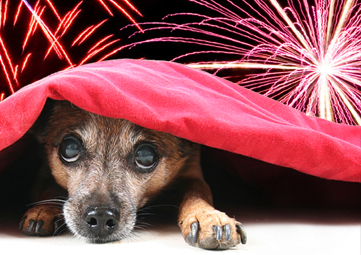 While fireworks can be lots of fun for us, they’re often a nightmare for pets. As well as being stressful for them, animals have really acute hearing and loud bangs and whistles can even cause them pain. But our simple guidelines are here to help:
While fireworks can be lots of fun for us, they’re often a nightmare for pets. As well as being stressful for them, animals have really acute hearing and loud bangs and whistles can even cause them pain. But our simple guidelines are here to help:
Small pets
Rabbits, guinea pigs, hamsters, gerbils, mice, ferrets and birds are all easily frightened and should be treated with special care when fireworks are being let off.
- Hutches/cages and enclosures should, if possible, be brought into a quiet room indoors or into a garage or shed.
- Give your pet extra bedding to burrow into so they feel safe.
- If you can’t bring your pet’s hutch inside, turn their enclosure around so that it faces a wall or fence instead of the open garden.
- Cover any aviaries or hutches with thick blankets or a duvet to block out the sight of the fireworks and deaden the sound of the bangs, but make sure there’s enough ventilation.
Dogs and cats
- Always keep dogs and cats inside when fireworks are being let off.
- Make sure your dog is walked earlier in the day before the fireworks start.
- Close all windows and doors, and block off door flaps to stop pets escaping and to keep noise to a minimum.
- Draw the curtains and, if your pets are used to the sounds of the TV or radio, switch them on (but not too loudly) in order to block out some of the noise of the fireworks.
- Make sure dogs are wearing some form of easily readable identification – even in the house. They should have at least a collar and tag.
- Think about fitting pets with a microchip so that if they do run away they have a better chance of being quickly reunited with you.
- Prepare a “den” for your pet where they can feel safe and comfortable – perhaps under a bed with some of your old clothes. They may like to hide there when the fireworks start.
- Let your pet pace around, whine, meow and hide in a corner if they want to. Don’t coax them out or disturb them – they’re just trying to find some safety.
- Try not to cuddle and comfort distressed pets as they’ll think you are worried too and this may make the problem worse. Instead stay relaxed, act normally and praise calm behaviour.
- Avoid leaving your pet alone if you know there are going to be fireworks nearby. If you do have to leave the house, don’t get angry with your pet if you find they have been destructive after being left on their own. Shouting at a frightened pet will only make them more stressed.
- Don’t tie your dog up outside while fireworks are being let off or leave them in the garden or car.
- Never take your dog to a fireworks display. Even if they don’t bark or whimper at the noise, it doesn’t mean they’re enjoying it. Excessive panting and yawning can sometimes indicate that your dog is stressed.
Horses and ponies
- Keep your horse in their familiar environment and routine. If they’re usually stabled, keep them stabled. If they’re normally out in the field, keep them there as long as it’s safe, secure and not near the fireworks display area.
- Ensure that you or someone experienced stays with your horse if you know fireworks are being set off. This way you can observe their behaviour, make sure they remain as safe and calm as possible and respond to their reactions appropriately.
- If you know your horse reacts badly to loud noises speak to your vet or perhaps consider moving your horse for the night.
- Try to remain calm and positive as horses can sense unease in a person and this might make things worse if they are startled.
- Be careful yourself. Try not to get in the way if your horse becomes startled, as you may get hurt.
- Don’t take the risk of riding when you think fireworks might be set off.
- If you need to leave your horse in someone else’s care during a fireworks show, leave clear instructions and contact details for you and your vet.
